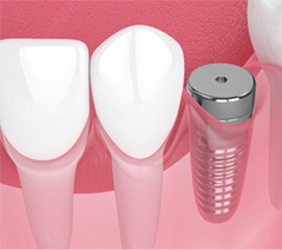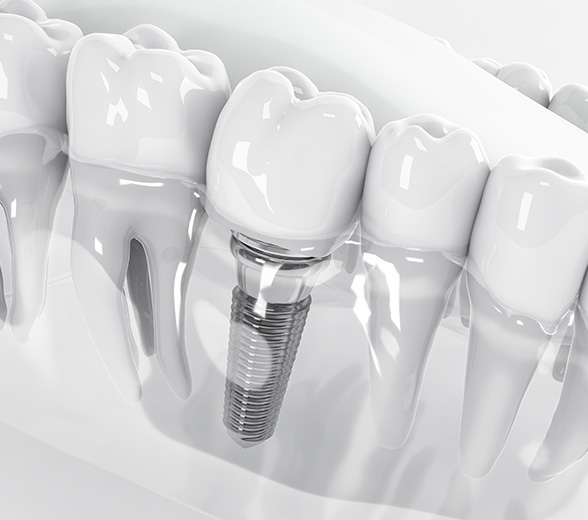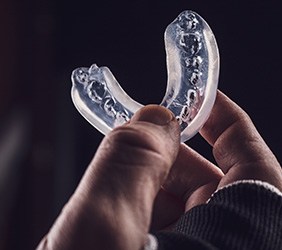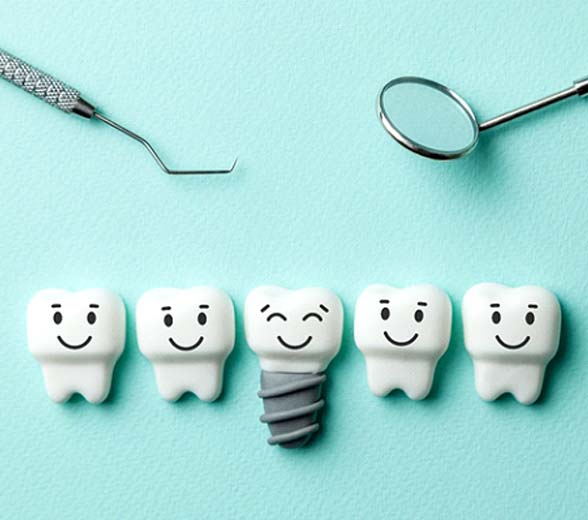Dental Implants – Greenville, TX
A Revolutionary Tooth Replacement
Dental implants have changed the way dentists look at replacing teeth. Before, all they could do was fill in the empty space above the gums. Now they have a way to replace the roots that used to rest in the jawbone as well. This is a complete game-changer that allows us to create new smiles that are just as beautiful and functional as the real thing. Dr. Garrad and the rest of our experienced team can smoothly handle the entire dental implant process here at Stone Street Dental. Call today to schedule an implant consultation and learn more about state-of-the-art solution dental implants in Greenville to replace missing teeth
Why Choose Stone Street Dental
for Dental Implants?
- Dental Implant Placement and Restoration All In-House
- Team with Over 15 Years of Experience
- Cheerful and Comfortable Dental Environment
What Are Dental Implants?

Made out of titanium (or zirconia in certain cases), dental implants are made to be placed in the jawbone. Osseointegration allows the jawbone to grow around the implant post and essentially fuse with it, anchoring it permanently in place so that it can serve as the foundation for a crown, bridge, or denture. You can get one implant to replace a single tooth, but it’s also possible to use multiple implants to replace the entire arch if need be.
The 4-Step Dental Implant Process

Unlike dentures and dental bridges, getting dental implants requires a multi-step process that will take several months. This may seem like a long time, but when you consider all the long-term benefits, you will understand why they’re worth it. While every treatment is unique, here are the four main steps that you can expect during the process of restoring your smile with dental implants.
Initial Dental Implant Consultation

The first step when it comes to restoring your smile is to schedule a consultation with us. At this time, we will take a look at your smile and surrounding facial structures. This will help us to determine whether dental implants are a good option for you and where and how they should be placed in the mouth. Some patients need to have preliminary procedures completed before getting dental implants, like bone grafting, gum disease treatment, and tooth extractions. After this, we can move forward to planning the rest of your treatment. During your consultation, we are also happy to walk you through the process so you know exactly what you can expect – including the timeline and cost.
Dental Implant Surgery

Dental implant placement surgery is relatively straightforward. After we numb your mouth with a local anesthetic, a small incision is made into the gum tissue to access your jawbone. The implants will then be placed at precise locations and angles. Lastly, your gums will be closed, and protective caps will be placed over the dental implant posts to keep them safe during the healing process.
Dental Implant Osseointegration & Abutment Placement

Over the next 3 to 6 months, the fusion process will take place between the implant and jawbone. This process is called “osseointegration.: This allows for your implant to have a sturdy foundation so that your replacement teeth will stay firmly in place. Once this process has been completed, we can place a metal abutment on the end of your implant.
Delivery of Dental Implant Restorations

A few weeks after your abutment has been placed, your restoration should be ready. You can return to our office where you will receive your new crown, bridge, or dentures (depending on the number of teeth that you are replacing). At this point, e will make sure that your bite is comfortable, and you will be sent on your way to enjoy the benefits of your new and improved smile.
Benefits of Dental Implants

Dental implants are versatile enough to replace any number of teeth. They are very easy to maintain, as you can brush and floss them as if they were normal teeth. Also, they keep your restorations anchored in place, and they offer enough biting strength to handle virtually any food. Since they’ve joined with the jaw, they can stimulate the surrounding bone so that it doesn’t break down. And finally, while traditional bridges and dentures have to be replaced every so often, dental implants are known to last 30 years or more and can often remain in the mouth for the rest of a patient’s life.
Who Dental Implants Can Help

You may be qualified for dental implant treatment if you have one or more missing teeth, have a jawbone that can successfully fuse with an implant, do not currently have gum disease, and have no medical conditions that would stop you from undergoing surgery. We can discuss your eligibility for implants (as well as potential ways to overcome any existing obstacles) at your consultation. The following situations can all be resolved with a carefully chosen number of implant posts.
Missing Single Tooth

Replacing a single tooth is the simplest implant procedure. All you need is one post and a crown. Because implants are so comfortable once they’ve joined with the jawbone and our crowns are made out of lifelike materials, you may find yourself occasionally forgetting which tooth is the one you had replaced.
Missing Multiple Teeth

When there are multiple teeth missing, we’ll need to give some thought as to the best way to replace them all with implants. For example, if three or more consecutive teeth have been lost, we can place two dental implants and use them to support a fully customized dental bridge.
Missing All Teeth

Did you realize that dentures could be attached to dental implants? This keeps them secured in place at all times, so you can say goodbye to untimely slips that cause you to slur your words. Also, putting dentures on implants makes it easier to eat tough-to-chew foods, and that’s good news when it comes to planning a healthy diet.
Understanding the Cost of Dental Implants

Do you need a single dental implant and crown, or are you planning to replace multiple teeth? Are you eligible for implant surgery right now, or are you going to need some preliminary treatments first? These are just a couple of the factors that go into the final cost of dental implants. No matter what you end up paying, remember that your implants will provide many life-changing benefits that you wouldn’t get from other options.
Dental Implants Post-Op Instructions

You already know that you’ll be numbed and sedated for the surgical placement of your implants, but many patients worry about what comes next. It’s natural to wonder what recovery is like and what you should expect. For example, many patients have questions about what symptoms are normal and when they might need help.
Thankfully, dental implants have an incredibly high success rate of 95%, so there’s not much to worry about as long as you follow Dr. Garrad’s post-op instructions. She’ll let you know how to care for your mouth so you can heal as quickly as possible without developing complications. Continue reading below to learn what our team recommends, and feel free to contact us for more information.
What to Do Directly After Dental Implant Surgery

After your procedure, your implant site must form a blood clot to prevent unwanted bacteria from causing an infection. Many after-care instructions are intended to help you keep it from being damaged or dislodged, including:
- Don’t drink from straws. You’ll need plenty of fluids to stay hydrated and boost your immune system, but the force of suction when drinking from a straw can remove your blood clot.
- Don’t spit. If you forcefully spit blood or saliva, you might lose your clot, too. Instead, use tissues to wipe or absorb the excess if you cannot swallow it.
- Don’t touch it. Do your best not to touch anything inside your mouth because you could introduce new germs that can cause problems or physically loosen the blood clot.
- Don’t smoke. Tobacco contains nicotine, which limits your cell’s oxygen levels and flow. This prevents them from delivering essential nutrients to your mouth, keeping it from mending.
Common Side Effects When Recovering from Dental Implant Placement

You probably have lots of questions about what your recovery will feel like and whether it hurts. Below, we’ve outlined some common symptoms that occur naturally during the healing process so you know more about what to expect:
- It’s normal to have some swelling after your surgery, but it usually gradually fades over the first week until it goes away. Applying alternating hot and cold compresses can provide some relief.
- You’ll likely experience some mild to moderate aches which often reach their peak about three days after your procedure. It’s typically safe to take over-the-counter medications to address it.
- Intermittent bleeding. Light bleeding or oozing is expected, and can often be slowed or stopped by applying light pressure to a piece of clean, folded gauze or a clean towel over the site. This can go on for a few days.
You should start feeling better day by day. If you experience anything unusual or have an issue that isn’t getting better, call us right away to let us know. We may need to schedule a visit to ensure that everything is healing as intended.
Your Diet After Dental Implant Surgery

Because you’re probably already feeling quite tender, it’s best to stick to soft foods for a few days to avoid exacerbating your condition. Popular options include:
- Mashed potatoes
- Scrambled eggs
- Soft pasta
- Ice cream
- Yogurt
- Pudding
You can resume eating more normally as soon as you feel ready, but remember that eating anything too crunchy, hard, or spicy could cause inflammation.
Post-Op Health & Oral Hygiene

Keeping your mouth clean is the best way to prevent an infection, but you must take care not to injure yourself. Tips for sanitizing the site include:
- Rinse with saltwater. You shouldn't brush your teeth the first day after your appointment because you can scrub away your blood clot. Instead, gently rinse with lukewarm salt water 2 or 3 times daily (ideally after meals).
- Brush carefully. Once you resume your usual daily dental hygiene routine, be as gentle as possible to allow your implant to recover.
- Pick the right products. Avoid any mouthwashes that contain alcohol because it can hinder healing.
What to Do After Your New Teeth Are Attached

It can take several weeks to months for the metal rod of your implant to fuse with your jawbone. Once it does, we can safely place your restoration. Thankfully, this step is non-invasive and doesn’t usually take long, so you might not even require a local anesthetic. You may experience some mild sensitivity once your crown, bridge, or denture is anchored in place, but typically, there’s little to no additional swelling, bleeding, or pain.
Maintaining & Caring for Your Dental Implants

There’s a good reason that many experts consider dental implants to be the ideal way to replace missing teeth. These resilient restorations have the potential to keep your smile happy, healthy, and whole for the remainder of your natural life. However, it’s essential to care for them properly to continue to make the most of the many benefits they provide. Continue reading to learn our recommendations for maintaining your prosthetics, and feel free to contact us if you have additional questions.
Make Oral Hygiene a Priority

Just because your dental implants can’t get cavities doesn’t mean you can ignore your daily dental hygiene routine. Cavities or gum disease can cause them to fail, so it’s as important as ever to keep up with your regular regimen. Our team recommends brushing and flossing twice daily to consistently remove plaque and bacteria buildup, in addition to scheduling a routine checkup and cleaning every six months.
Eat a Wholesome Diet

Did you know that your artificial teeth can restore up to 90% of your original chewing power? They’re directly embedded into your jawbone, so unlike alternatives like dental bridges and dentures, they function as sturdy stand-alone structures. That means you can eat a wide variety of foods that can contribute to your dental condition. For instance, citrus fruits have vitamin C for healthy gums, while dairy products are full of calcium for strong teeth and bones.
Break Bad Habits

Some patients indulge in certain habits that can cause their dental implants to fail. For example, if you drink too much alcohol or regularly smoke cigarettes, vape, or chew tobacco, then you’re putting them at risk. These indulgences can hinder your body’s ability to heal, which in turn destabilizes your restoration.
Also, using teeth as tools can chip, crack, or break them and should be avoided. Taking a few extra moments to locate a pair of scissors, knife, or other appropriate tool can preserve your oral health.
Protect Your Dental Implants

Although your prosthetics are incredibly durable, they’re not completely invincible. If you participate in contact or team sports or practice martial arts, then you may want to invest in a mouthguard. This oral appliance evenly distributes the force of a blow across all your teeth to cushion them from harm.
Similarly, if you suffer from chronic teeth grinding (or bruxism) a nightguard can prevent cracks and breaks from all the added tension. Our team is happy to provide a custom-fitted device to keep them safe.
Schedule Regular Dental Checkups

Visiting our team for a routine checkup and professional cleaning allows us to monitor your overall dental condition. That way, if any problems arise, like weakening enamel, signs of early gum disease, or a loose or damaged restoration, we can address them before they progress. This can preserve your oral condition and your budget in the long run because you’ll be less likely to require emergency procedures to correct major issues.
Dental Implant FAQs

Dental implants are an ideal option for replacing missing teeth thanks to their numerous benefits. However, they are quite an investment, so it pays to be well-informed. Here are the answers to some of the most common questions we receive about dental implants in Greenville. If you don’t see the information that you’re looking for below, just give us a call . Our friendly team would be happy to answer any questions you have and get you started with an initial consultation.
How Long Do Dental Implants Last?
The lifespan of dental implants typically depends on the health and lifestyle choices of the patients. To ensure that your implants last, it’s important that you brush, floss, and rinse with a mouthwash on a daily basis. See your dentist regularly for cleanings and checkups, and avoid chewing on anything particularly hard or sticky. With proper maintenance, implants can last upwards of 30 years. This is several times longer than the average traditional bridges and dentures.
Does Getting Dental Implants Hurt?
The jawbone doesn’t have very many nerve endings and your mouth will be numbed with a local anesthetic before the procedure begins. You will also most likely be sedated, lowering your body’s ability to register pain. While the surgery shouldn’t hurt, your mouth may be sore for a few days following the procedure. To manage this, take recommended over-the-counter and prescribed pain relievers as directed. Cold compresses can also help to reduce discomfort. If discomfort worsens instead of improving after two to three days, give us a call.
Will I Have to Take Off Work for Dental Implant Surgery?
Most patients only need to take one or two days off work to get dental implants. If your job is physically demanding, you may want to take at least three to four days off, as heavy exercise can divert blood from the implant site and delay healing. However, every case is different. During your initial consultation, we’ll be able to give you a more specific recommendation to meet your unique needs.
Can I Get Dental Implants If I’m Diabetic?
If your diabetes is under control, your odds of dental implant success are generally comparable to those of nondiabetic patients. Uncontrolled diabetes can slow down the healing process, making it harder for your implants to integrate with your jawbone. If you are interested in getting dental implants but have diabetes, talk to your endocrinologist or primary care physician about getting your blood sugar levels under control beforehand.





